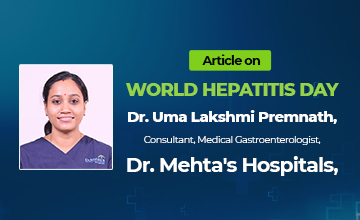The liver is one of the major organs in our body playing a major role in the metabolism of various drugs, immune functions, synthesizing proteins and clotting factors, bile production and excretion, excretion bilirubin, cholesterol, and various hormones. Its inflammation due to any cause is called hepatitis. July 28th is earmarked as World hepatitis day as the liver is affected by various lifestyle diseases.
what are the common conditions affecting our liver?
Among the common causes are Alcohol, NAFLD (nonalcoholic fatty liver disease), alcohol, viruses, and toxins, metabolic and autoimmune causes. These conditions if left unattended for long can land you in chronic liver disease or cirrhosis ( Medical term ) the common symptoms of which are abdominal distension, yellowing of eyes and urine, bleeding or bruising easily, leg swelling, confusion, coma. Much talked of today is NAFLD, which in itself is a lifestyle disease involving Diabetes, Systemic Hypertension, Obesity, high blood cholesterol levels. Left uncorrected, it can progress to NASH (non-alcoholic steatohepatitis), but if recognized and treated in early stages is reversible with lifestyle management, low carb diet, and appropriate medication. Among the other hepatotropic viruses are hepatitis B and C.
what are the symptoms of liver ailment?
The symptoms vary according to the etiology. Sometimes it only causes symptoms like nausea, body ache, yellowing of urine eyes, or skin. NAFLD may come without any symptoms. It is incidentally diagnosed while evaluation your liver biochemistries or during routine imaging of your liver. These symptoms occur in hepatitis caused by viruses like A, B, C commonly, and usually get better but can take weeks or few months. But in some, it can go on to end up in chronic liver disease. Hence guidance from your specialist and compliance to medication is needed. In fact, NASH, Hepatitis C, and B are also among the common causes of liver transplantation worldwide.
Liver and COVID -19
Patients with or without preexisting liver disease may have an elevation in liver biochemistries. Liver involvement is reported on 14-58 % of patients hospitalized with COVID. An elevation in AST And ALT ( aminotransferases ) are more commonly seen than ALP ( alkaline phosphatase ) even though the ACE 2 receptors to which the virus binds are found in the liver Cells and the bile duct cells. The elevation is usually less than 5 times the upper limit of normal. In severe COVID, albumin may also be low, however, it’s unclear if low albumin is a risk factor for severe COVID or is a result of severe COVID.
When to test for COVID in patients with hepatitis
Diagnosis of COVID is suspected in patients with new-onset fever or respiratory symptoms (cough, breathlessness)
Some patients with COVID 19 have abnormal biochemistries and we favor testing in the following cases
1. Hospitalised patients with elevated biochemistries even in the absence of fever or respiratory symptoms.
2. When outpatients with established liver disease present with any of the following
- Elevated biochemistries at least 3 times from baseline, with or without jaundice.
- Symptoms of fatigue abdominal pain or anorexia (may be associated with a disease flare)
- C. Symptoms like altered sensorium (hepatic encephalopathy)
Data from the international registry have suggested that 25 % of patients with new liver decompensation and COVID may not have any respiratory symptoms.
Summary
Chronic liver disease in the absence of immunosuppressive treatment is not known to be a risk to be associated with increased risk of COVID Remdesvir is not recommended if the biochemistries are more than 5 times from the baseline.
FAQ:
1. In general, what must we do to protect our liver?
Cut down carbs, exercise and weight loss, abstinence from alcohol, screening for hepatitis viruses, guidance from specialist and compliance with treatment, vaccinate yourself against hepatitis A and B, and top it with booster doses, avoid sharing sharp objects like razors, needles or syringes as the virus can spread.
Article by
Dr. Uma Lakshmi Premnath,
Consultant, Medical Gastroenterologist,
Dr. Mehta’s Hospitals.

